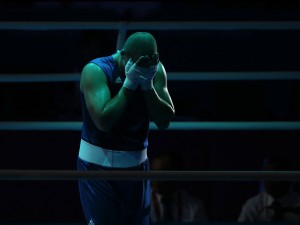Heavyweights protest decisions in Olympic boxing

Siarhei Karneyeu of Belarus, reacts after his fight against Teymur Mammadov of Azerbaijan, during a heavyweight 91-kg quarterfinal boxing match at the 2012 Summer Olympics, Sunday, Aug. 5, 2012, in London. AP/Ivan Sekretarev
LONDON – Siarhei Karneyeu lingered in the ring after his Olympic heavyweight loss Sunday night, crying and shaking his head in disbelief after his clutching, holding opponent was awarded a narrow decision victory.
When Cuba’s Jose Larduet fell victim to a similar decision about 15 minutes later, the Belarusian Karneyeu came back up the fighters’ tunnel and intercepted Larduet on the way out of the ring, holding up Larduet’s hand as the real winner.
Both Karneyeu and Larduet felt cheated by their opponents’ clutch-and-grab tactics in the Olympic boxing tournament Sunday night, which means their fights will be decided outside the ring.
After the show, amateur boxing’s governing body confirmed Belarus and Cuba had immediately protested the losses. AIBA planned to conduct the reviews Sunday night.
Azerbaijan’s Teymur Mammadov beat Karneyeu on the tiebreaking countback despite blatantly holding Karneyeu, and Italy’s Clemente Russo beat Larduet 12-10 with an awfully similar strategy to close the first round of quarterfinal bouts in London.
Mammadov and Russo are hardly the first heavyweights in boxing history to make up for their exhaustion or skill deficiencies by holding, but the referees in their bouts didn’t deem the holding severe enough to penalize.
Their opponents strongly disagreed — and their protests have significant precedent in a tournament that already has seen two results overturned when AIBA determined the ring official hadn’t penalized blatant misbehavior.
AIBA overturned the result of Indian welterweight Krishan Vikas’ victory over Errol Spence of the U.S. team, determining Vikas had committed nine unpenalized holding fouls in the final round alone.
Although the men’s tournament is being upstaged by the women’s Olympic debut this weekend, everybody who wins from here on is guaranteed a medal — providing the results of their bouts aren’t changed by AIBA, which has been aggressive in addressing appeals of its officials’ decisions in London.
Earlier, bantamweight Luke Campbell clinched the dominant British team’s first boxing medal of the Olympics, riding the crowd’s overwhelming support to a 16-15 victory over Bulgaria’s Detelin Dalakliev.
John Joe Nevin clinched Ireland’s first medal in any London sport with a 19-13 victory over promising pro prospect Oscar Valdez of Mexico. Nevin’s semifinal bout is against top-seeded Lazaro Alvarez of Cuba, who beat Brazil’s Robenilson Vieria.
After lightweight Nicola Adams won her opening bout in the first women’s Olympic tournament earlier Sunday, Britain had six men and three women in position to win medals in its home Olympics. Campbell took the first step with a closer-than-expected win.
Nevin appeared more relieved than elated when he secured Ireland’s first medal by holding off Valdez, who dropped Nevin to the canvas in the third round with a vicious hook to the body. The decision left Valdez in tears and unable to speak as he failed to secure the first boxing medal since 2000 for Mexico.
“Oscar Valdez will be a world champion someday,” Nevin said. “I honestly believe that. He caught me with a cracker of a shot. He’s a strong opponent, but he seemed to be tiring, and he started missing some punches. … It means a lot to me to win this medal, and hopefully I can change it into a different color.”